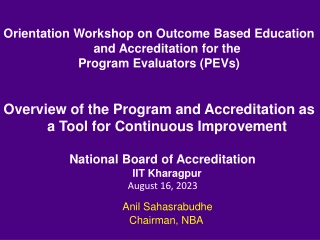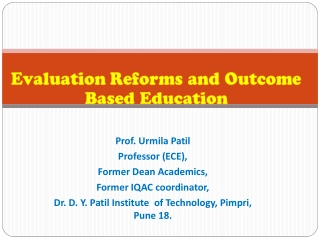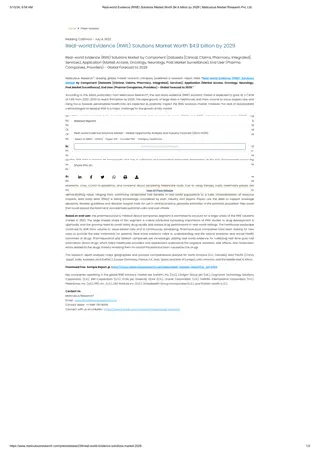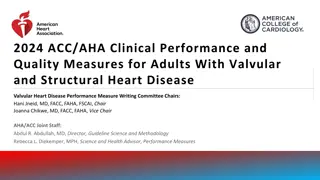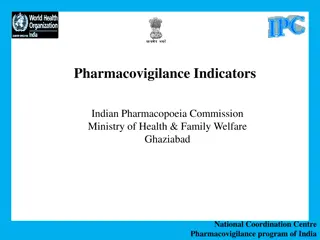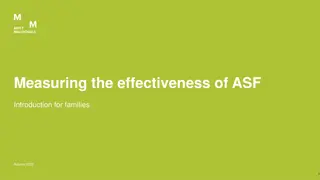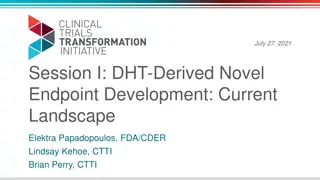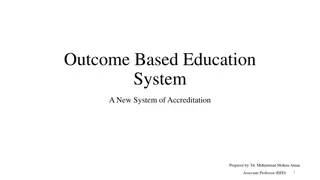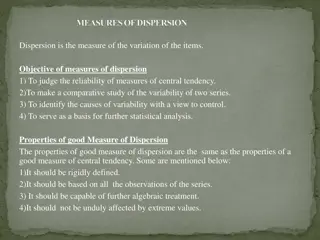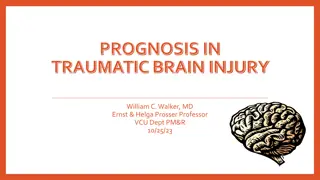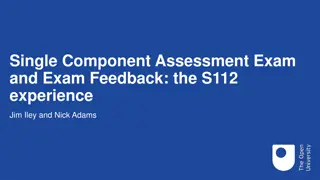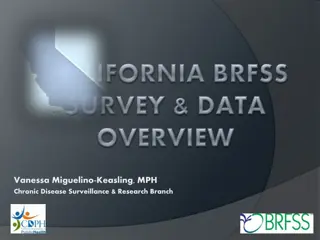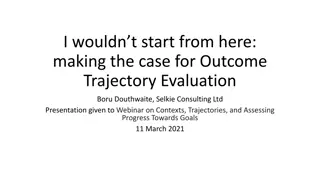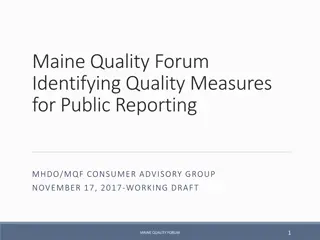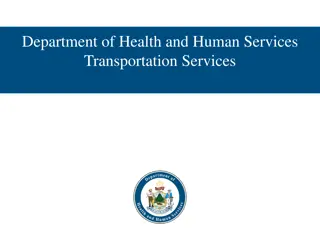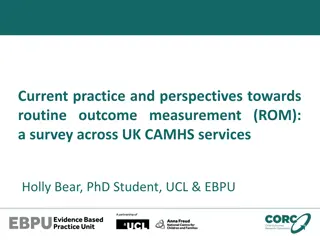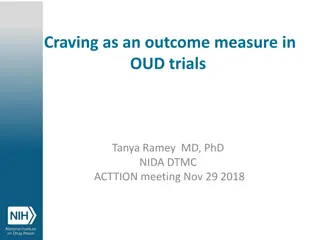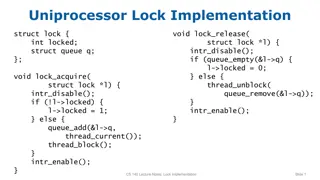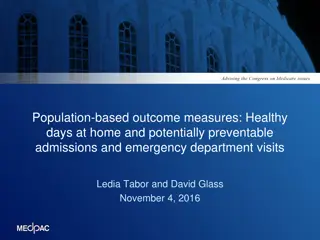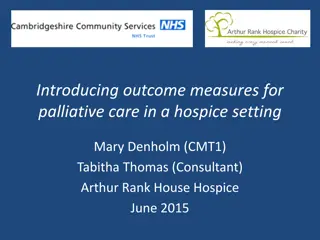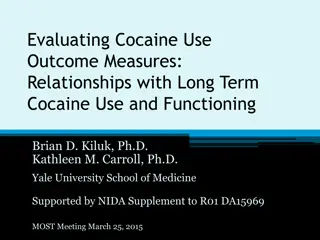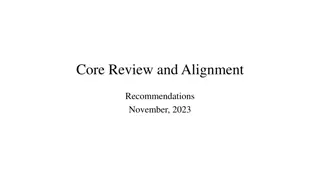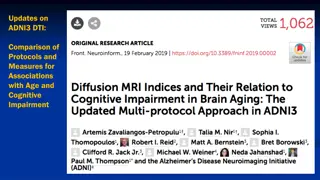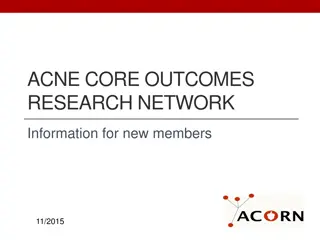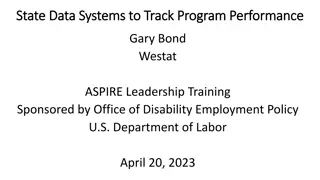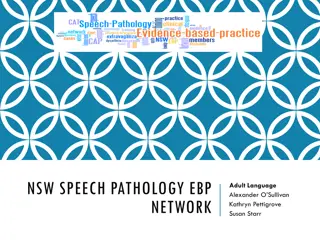Orientation Workshop on Outcome-Based Education and Accreditation
Outcome-Based Education (OBE) and Accreditation as tools for continuous improvement, presented by the National Board of Accreditation (NBA). Join Chairman Anil Sahasrabudhe at IIT Kharagpur on August 16, 2023.
2 views • 10 slides
Student-Centric Outcome-Based Education
Explore Outcome-Based Education (OBE) by Prof. Urmila Patil, focusing on student-centric teaching and learning methodology with clear objectives and outcomes. Discover how OBE enhances curriculum delivery and assessment.
1 views • 30 slides
Terrestrial Planets and Core Dynamics
Exploring the core-mantle interaction from the early Hadean period to present times reveals intriguing questions about the outer core's electrical conductivity, geodynamo sustainability, and inner core characteristics. Studies indicate challenges in maintaining the geodynamo, potential heat sources
9 views • 48 slides
Real-world Evidence (RWE) Solutions Market Worth $4.9 billion by 2029
The large share of this segment is mainly attributed to the growing amount of medical data generated in hospitals and the increasing dependence of outcome-based studies on real-world data. EHRs are the most commonly used form of healthcare database that helps in conducting outcome-based studies.
0 views • 2 slides
ACC/AHA Clinical Performance Measures for Valvular Heart Disease
This document highlights the development of performance measures for adults with valvular heart disease by a writing committee, providing 11 measures for clinical use. The measures are divided into performance and quality categories, with emphasis on applicability, areas of improvement, and potentia
1 views • 13 slides
Pharmacovigilance Indicators for Monitoring Health Interventions in India
The pharmacovigilance indicators outlined by the Indian Pharmacopoeia Commission focus on evaluating the status of pharmacovigilance systems in India. These indicators help measure the effectiveness of health services and interventions, identify strengths and weaknesses, and determine the impact and
2 views • 14 slides
Introduction of Outcome Measurement Tools for ASF Families Autumn 2023
The Department for Education is implementing outcome measurement tools for families accessing the Adoption Support Fund (ASF). These tools aim to track progress and impact without sharing any identifying data, helping to evaluate the overall effectiveness of ASF interventions. Families will experien
2 views • 7 slides
Digital Health Technology-Derived Clinical Outcome Assessments in Regulatory Decision-Making
This session discusses the landscape of DHT-derived novel endpoints in clinical research, focusing on considerations for regulatory decision-making. It explains the use of digital health technology in clinical outcome assessments and highlights the potential benefits of digitally collected COAs, suc
0 views • 42 slides
Repeated Measures ANOVA in Research Studies
Repeated Measures ANOVA is a statistical method used in research to analyze data collected from the same subjects under different conditions or at multiple time points. This method allows for comparing means across various treatments or time intervals within the same group, offering insights into wi
0 views • 52 slides
Outcome-Based Education System and Bloom's Taxonomy in Engineering Education
Dr. Muhammad Mohsin Aman discusses a new system of accreditation focusing on Outcome-Based Education (OBE) in engineering education. The presentation covers Bloom's Taxonomy, OBE accreditation advantages, Washington Accord, engineering attributes, PEC and NED roles, educational objectives, learning
1 views • 61 slides
Measures of Dispersion in Statistics
Measures of dispersion in statistics help in understanding the variability of data points. They are essential for assessing the reliability of central tendency measures, comparing data sets, identifying variability causes, and guiding further statistical analysis. The properties of a good measure of
2 views • 8 slides
Prognosis in Traumatic Brain Injury
Prognosis in traumatic brain injury is influenced by various factors such as population characteristics, impairment levels, and time frames. Predicting short-term and long-term outcomes is crucial for effective patient care, financial planning, and resource utilization. Common outcome measures inclu
1 views • 46 slides
Analysis of Single Component Assessment Exam Feedback for S112 Module
The assessment strategy for the S112 module involves a single exam component alongside several TMAs. Findings show little gaming of the system, with most students submitting assignments. Exam performance correlates with the number of assignments submitted. The outcome of the module seems to be affec
1 views • 27 slides
Progress Update on Outcome 12: Public Service Development
Implementation progress report on Outcome 12 focusing on achieving an efficient, effective, and development-oriented public service. Key priorities, achievements, challenges, and remedial actions are highlighted, along with a review of the impact indicators for the Medium-Term Strategic Framework. T
5 views • 46 slides
Overview of BRFSS Survey and its Core Components
The Behavioral Risk Factor Surveillance System (BRFSS) is a state-based telephone survey that monitors personal health behaviors in non-institutionalized adults. It collaborates with the CDC and all 50 U.S. states to gather data on various health topics. The survey includes fixed core questions on d
0 views • 18 slides
Overview of CUPE Local 3550's Response to Anti-Union Legislation
A detailed overview of Bill 32, an anti-union legislation affecting Canadian Union of Public Employees (CUPE) Local 3550, which requires categorization of dues into core and non-core, with members opting in for non-core spending. The local has reviewed its budget, confirming it is 100% core, and emp
0 views • 14 slides
Recertification and Assessment of Core Curriculum Courses
The Core Curriculum Council of the Faculty Senate presents a process for recertification and assessment of core curriculum courses to maintain integrity and quality. Courses must be recertified every four years to ensure consistency amidst changes in instructors, content, and teaching methods. State
0 views • 33 slides
Enhancing Alignment Between Introductory Biology and Core Courses
Explore the alignment of the Biology core curriculum, focusing on the structure, goals, and rationale behind flipping portions of the curriculum. Evaluate the preparedness of students for core courses, identify gaps, redundancies, and essential knowledge transfer. Study design involves categorizing
1 views • 25 slides
Pilot Studies in Advancing Dementia Care: Core Considerations
Pilot studies play a crucial role in exploring interventions, determining necessary modifications, assessing feasibility, and confirming stakeholder acceptance. They help in testing study protocols, assessing data collection procedures, and evaluating outcome measures. Feasibility studies are essent
0 views • 9 slides
Analysis of Seasonal Variations in Gulf Plains Convective Cores
The analysis reveals fascinating insights into Gulf Plains convective cores, showcasing variations in core numbers, average pixels per storm, pixels per core, and core sizes across different seasons. Deep-Wide cores dominate in the summer, while Gulf cores are larger in the fall. The study sheds lig
1 views • 4 slides
Rethinking Program Evaluation: Embracing Outcome Trajectories
Program evaluators are encouraged to shift focus from the traditional program theory of change to exploring outcome trajectories, which consider the broader context and interlinked changes over time. This approach offers a more insightful understanding of program outcomes and their evolution. An exa
0 views • 18 slides
Contemporary Clinical and Echocardiographic Outcomes of 1000+ Patients Treated with MitraClip G4: EXPAND G4 Study
This study focuses on the outcomes of 1164 patients receiving the MitraClip G4 system for PMR or SMR across multiple countries. The study aims to confirm the safety and effectiveness of the 4th generation MitraClip G4 system in a real-world setting. Key outcome measures include acute procedural succ
0 views • 19 slides
Achieving Mission Fulfillment Through Core Themes: An Update
In 2016, our college established four core themes to represent its mission at the core. These themes - Academic Transfer, Career & Technical Education, Essential Skills, and Lifelong Learning - serve as indicators to gauge our progress towards fulfilling our mission. Currently, we are performing abo
0 views • 18 slides
Semantic Data Model of Electronic Invoicing Core Elements
Presentation by Fred van Blommestein on the EN16931-1 semantic data model of core elements in electronic invoicing, covering invoice processes, core invoice design, semantic model details, business rules, and invoicing principles. The model includes 160 elements in 33 groups, with mandatory elements
0 views • 13 slides
Quality Measures in Healthcare: Maine Quality Forum Initiatives
Maine Quality Forum (MQF) collaborates with various healthcare stakeholders to provide comparative health care quality information to consumers, purchasers, providers, insurers, and policy makers. The forum focuses on reporting provider-specific quality measures, aligning with the Institute of Medic
0 views • 12 slides
DHHS Coordination of Transportation Service Contracts Overview
The Department of Health and Human Services in Maine conducted an assessment of Transportation Services in June 2019. The workgroup identified three main priorities: alignment of Quality and Performance Measures, Safety Measures, and Evaluation of Transportation Services. The first priority involves
1 views • 28 slides
Survey on Routine Outcome Measurement in UK CAMHS Services
This study by Holly Bear, a PhD student at UCL & EBPU, explores the current practices and perspectives towards routine outcome measurement (ROM) in UK Child and Adolescent Mental Health Services (CAMHS). The research delves into the barriers and facilitators to utilizing outcome measurement in pract
0 views • 18 slides
ASP.NET Core: Features, Ecosystem, and Differences
ASP.NET Core is a modern framework for building web applications with cross-platform capabilities. It offers a leaner and modular approach compared to ASP.NET Framework. With support for both .NET Core and full .NET Framework, ASP.NET Core enables developers to create applications that can run on Wi
1 views • 9 slides
Craving as an Outcome Measure in OUD Trials
Craving plays a vital role in substance use disorder (SUD) diagnosis, with intense desires or urges triggered by environmental cues. The focus is on identifying and validating the best craving measure for OUD clinical trials. Near-term goals include qualifying craving as a Clinical Outcome Assessmen
0 views • 12 slides
Lock Implementation Strategies for Single-Core and Multi-Core Systems
The provided content outlines several lock implementation strategies for both single-core and multi-core systems. It covers the structures, functions, and techniques used to manage locks efficiently, including releasing locks, acquiring locks, and handling synchronization. Different versions of lock
0 views • 6 slides
Population-based Outcome Measures: Healthy Days at Home and Preventable Admissions
The content discusses population-based outcome measures focusing on Healthy Days at Home (HDAH) and Potentially Preventable Admissions (PPA). It explores the direction for Medicare quality measurement, emphasizing the importance of these measures in evaluating healthcare quality. The concept, calcul
0 views • 18 slides
Outcome Measures in Palliative Care: Introducing IPOS Questionnaire
Outcome measures in palliative care play a crucial role in ensuring quality of life for patients. This study introduces the Integrated Palliative Care Outcome Scale (IPOS) questionnaire as a tool to assess patient well-being, symptoms, and concerns. The primary objectives include implementing and au
0 views • 15 slides
Evaluating Cocaine Use Outcome Measures & Relationships with Long-Term Use
This study evaluates 15 treatment outcome measures for cocaine use across multiple randomized controlled trials from 2000 to present. The criteria include sensitivity to medication and behavioral therapies, post-treatment cocaine use, and general functioning. Various studies focus on treatments such
0 views • 20 slides
Journey to the Earth's Layers
The Earth's structure consists of four main layers: the crust, mantle, outer core, and inner core. The crust is the thin, rocky layer we see on the surface, while the mantle is a solid layer that flows like a viscous liquid. The outer core is a hot, melted layer of iron and nickel, and the inner cor
0 views • 10 slides
Core Review and Alignment Committee Updates
The Core Review and Alignment Committee established in 2021 at WSU is diligently evaluating the existing core requirements, aligning them with learning outcomes, and addressing issues such as student transfers, distinctiveness of the core, and student recruitment and retention efforts.
0 views • 13 slides
Insights into DTI and Advanced MRI Measures for Cognitive Impairment
Comparison of DTI protocols and measures in 317 participants revealed strong associations with age and cognitive impairment. MD and TDF-FA emerged as best measures, with robust connections to age. NODDI in advanced MRI allows for differentiation of A-beta positive and negative groups, offering great
1 views • 6 slides
ACORN Core Outcomes Research Network Overview
ACORN (ACNE CORE OUTCOMES RESEARCH NETWORK) was established in July 2013 with the aim of creating a standardized set of core outcome measures for use in acne clinical trials. Led by key individuals such as Diane Thiboutot, Jerry Tan, and Alison Layton, ACORN focuses on global representation, stakeho
0 views • 10 slides
Developing an Effective Outcome Monitoring System for Program Performance
Explore the process of establishing an outcome monitoring system for program performance, focusing on key questions, facilitators, barriers, and target audiences. Learn how to simplify the system, identify goals, use standardized measures, and provide timely feedback to enhance program effectiveness
1 views • 18 slides
Evidence-Based Practices in Discourse Treatments for Aphasia
This research review explores the effectiveness of discourse treatments for aphasia, focusing on improvements in discourse that lead to better outcomes for individuals with aphasia. Various treatment techniques and outcome measures are discussed, highlighting the potential benefits of specific inter
0 views • 14 slides
System of Environmental-Economic Accounting Core Tables for Water
System of Environmental-Economic Accounting (SEEA) provides core tables and accounts focusing on water accounting and other environmental aspects. The core tables offer concise and relevant information essential for deriving indicators and formulating evidence-based public policies. These tables aim
0 views • 15 slides
